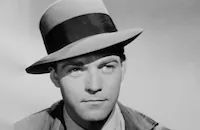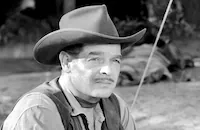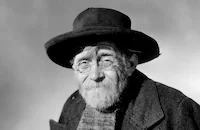Four Sons
Brief Synopsis
Cast & Crew
Archie Mayo
Don Ameche
Eugenie Leontovich
Mary Beth Hughes
Alan Curtis
George Ernest
Film Details
Technical Specs

Synopsis
In 1936, in the village of Czechoslovakian Kolna near the German border, Frau Freida Bern lovingly cares for her sons, Chris, Karl, Fritz and Joseph. The boys' father was killed in World War I when he was forced to fight for Germany, and Frau Bern is delighted that Joseph is carrying on his father's dream of going to America. Frau Bern gives the money she has saved to Joseph for the journey, and the other boys unselfishly wish him well and tell him to send for them. Meanwhile, Chris, who is very patriotic, argues with Karl, who has joined a German "social club" and supports Germany. The rift between the brothers grows deeper when Karl and Anna, Chris's longtime girl friend, discover that they are passionately in love. Frau Bern makes peace between the brothers, and Chris puts aside his feelings to celebrate at Anna and Karl's wedding. At the reception, however, Karl is called to duty by his German friends, who are seeking to kill one of their captured spies before he talks. Anna is crushed to discover that her bridegroom has disappeared on their wedding night, but vows to stand by him and tends to his injuries when he returns home after accomplishing his mission. As time passes, Anna presents Karl with a son, and Joseph gets a good job in New York. One day, Karl is visited by Nazi officers, who wish for him to formally enlist in the Army. Chris and Karl almost come to blows after Chris pulls a gun on the men, but once again their mother urges them to forego their violence. Frau Bern tries to convince Karl that the Nazis are wrong, but he refuses to listen, and later, when the Czechs mobilize against the Nazis, Karl enlists as a Nazi officer, while Chris marches with the Czech Army. The Czechs are forced to cede Sudetenland to the Nazis in order to avoid war, and Chris bitterly decries traitors like Karl, who deserted the Czech Army. Chris and Karl return home, and after Chris discovers from Karl that the Nazis have a list of local citizens who are to be murdered so that they do not cause trouble, he rushes out to warn them. He is too late to save the burgomaster, whom he finds dead in his home, and he is then chased and wounded by Nazi soldiers. While Chris is hiding in the swamp, he sees and shoots a Nazi soldier who is searching for him. Chris makes it back home, where Frau Bern hides him before the Nazis find him. The soldiers, led by former family friend Max Sturm, arrive and instead of looking for Chris, who they do not know is the one who shot the soldier, they bring Karl, who has been badly wounded. Frau Bern realizes that Chris accidentally shot his own brother, but nonetheless tries to force Anna to keep quiet after Karl dies. Anna spitefully denounces Chris, and he is killed when the Nazis find him. Soon after, Joseph sends money for his mother and Fritz to come to America, but it is too late, for Fritz is drafted into the German Army. The grieving mother says goodbye to her youngest son, and soon he is killed in Warsaw. Frau Bern is presented with the Iron Cross for Fritz's bravery, and she bitterly comments that the first time she was presented with the medal was when her husband was killed. After Frau Bern sees a troop of young boys learning to march, she pleads with Anna to take Karl, Jr. to America. Anna finally admits that the war is senseless, and the two women go with the child to the train station. There they are bid farewell by Joseph's former schoolteacher, Herr Kapek, who has just been released from a concentration camp, and he assures them that "barbed wire cannot hold the spirit of man." Frau Bern, Anna and Karl, Jr. board the train, and begin the journey to a new life of freedom.

Director

Archie Mayo
Cast

Don Ameche
Eugenie Leontovich
Mary Beth Hughes

Alan Curtis
George Ernest

Robert Lowery
Lionel Royce

Sig Rumann

Ludwig Stossel

Christian Rub
Torben Meyer
Egon Brecher
Eleanor Wesselhoeft
Michael Visaroff
Greta Meyer
Ernst Hausman
Davis Roberts
Hans Schumm
Fredrik Vogeding
William Von Brincken
Ragnar Qvale
Robert Conway
Bobby Caldwell
Anna Lisa
Herta Lynd
Bill Roberts
William Yetter
Hans Von Morhart
Hans Joby
Wolfgang Zilzer
Lotte Palfi
Paul Weigel
John Bleifer
Anna Marie Schunzel
Lee Kohlmar
Arno Frey
Steve O'brien
Carlo Clarke
Georgia Clarke
Bodil Rosing
Arthur Loft

Joseph Crehan
Crew
Travis Banton
Harry Brand
Harry Joe Brown
Alfred Bruzlin
David Buttolph
Richard Day
Lorraine Dunne
Roger Heman
Albert Hogsett
John Howard Lawson
Thomas Little
Francis D. Lyon
Leon Shamroy
Milton Sperling
Henry Weinberger
Darryl F. Zanuck

Film Details
Technical Specs

Quotes
Trivia
Notes
According to a February 20, 1940 Hollywood Reporter news item, both Maria Ouspenskaya and Jane Darwell were under consideration for the role of "Frau Freida Bern." According to story conference notes contained in the Twentieth Century-Fox Produced Scripts Collection at the UCLA Theater Arts Library, screenplay writer John Howard Lawson wrote the part with Ouspenskaya in mind, although producer Darryl Zanuck favored Darwell for the role. Zanuck also suggested that Ray Milland be considered for the role of "Karl Bern," and Richard Greene be considered for that of "Chris Bern." According to publicity for the film, Zanuck signed Alan Curtis to a long-term contract after early phases of the shooting were completed. Curtis had been borrowed from M-G-M. According to a Twentieth Century-Fox publicity release, Gregory Ratoff and Sidney Lanfield assisted director Archie Mayo with the audition screen tests. Ratoff directed the test of his wife, European stage actress Eugenie Leontovich, who made her screen acting debut in Four Sons. According to Hollywood Reporter news items, Nancy Kelly was originally signed for the role of "Anna," but was replaced by Mary Beth Hughes when she was loaned to Universal for Private Affairs (see below), and Ernest Palmer had been assigned to photograph the picture. According to the publicity release and a New York Times article, this was the last film made by "Hollywood's private army," a group of mostly World War I veterans led by ex-Army sergeant Carl Voss. Voss trained and drilled the men to act as extras, and they made their first appearance in the 1925 M-G-M film The Big Parade. Voss was forced to disband the group because of new Screen Actors Guild regulations forbidding any payments by extras to agents. They had appeared in 232 filmed battles. Fox first filmed I. A. R. Wylie's story in 1928. John Ford directed the picture, which was also entitled Four Sons, and it starred James Hall and Margaret Mann (see AFI Catalog of Feature Films, 1921-30; F2.1941).












